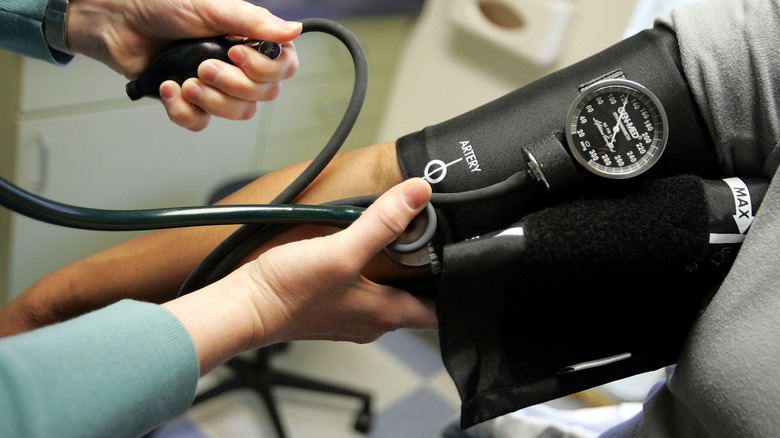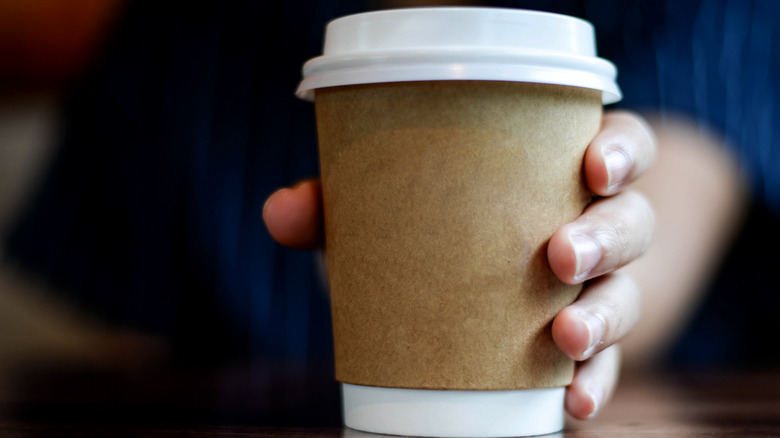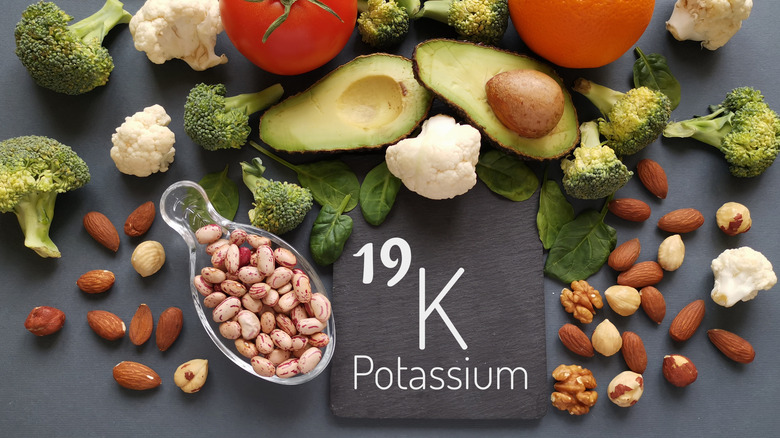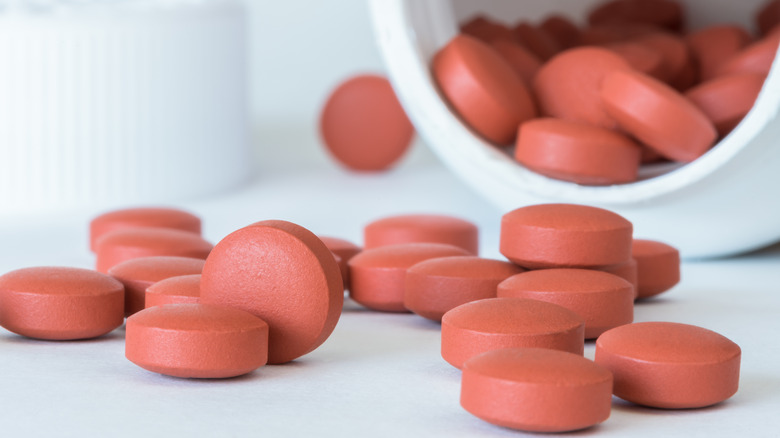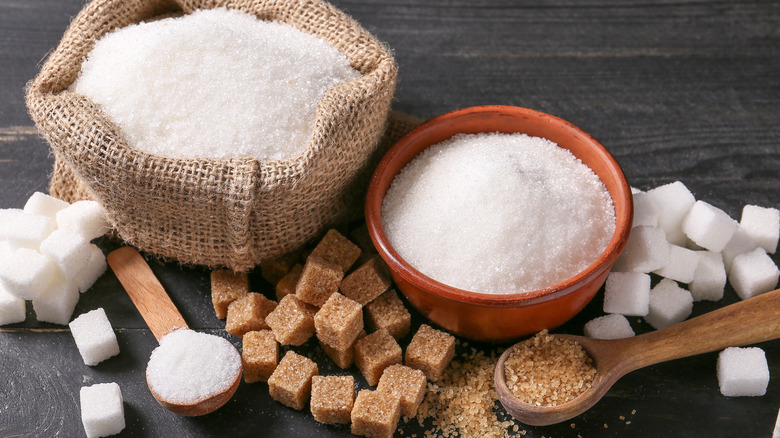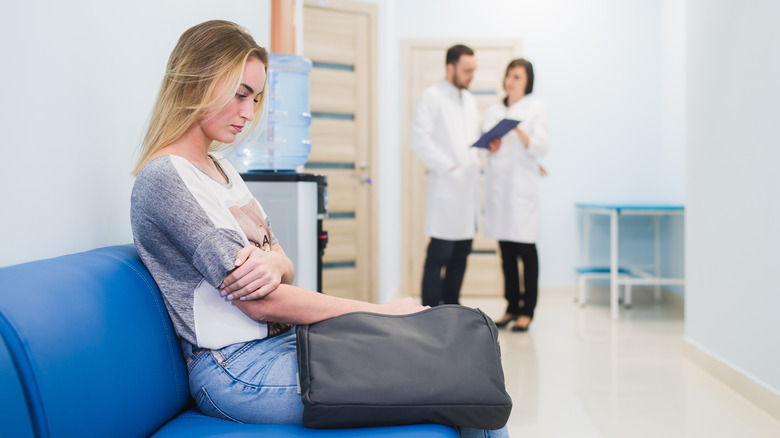Surprising Things That Affect Your Blood Pressure
You've likely heard that high blood pressure, or hypertension, is a solid indicator that something could be wrong with your cardiovascular system. Although an occasional high reading isn't usually a cause for concern, regular high readings are likely warning you that there's an underlying problem that may put you at risk for heart disease.
There are plenty of things that can affect your blood pressure, many of which are ones we've all heard of from our doctors or middle school health classes. Eating a not-so-healthy diet that's high in salt — think processed foods — is a major culprit. Other common contributors include living an inactive lifestyle, being obese, smoking, or drinking too much alcohol, according to the Centers for Disease Control and Prevention (CDC).
But there are many not-as-common factors that can surprisingly spike your blood pressure, temporarily or long term. Here's a look at a few sneaky things that could affect your blood pressure.
Thyroid problems can play a role
Your thyroid handles a ton of what happens in your body. It controls your metabolism and makes sure your body's processes are staying on top of their functions, according to the Cleveland Clinic. When your thyroid isn't working properly, you could end up with hypothyroidism or hyperthyroidism. Hypothyroidism is a condition where the thyroid doesn't produce enough thyroid hormone, and it's the one that could contribute to high blood pressure.
An article published in American Family Physician revealed the results of a study that included a mix of patients with hypothyroidism, high blood pressure, both conditions, or neither condition. When researchers gave hypothyroid patients with hypertension more thyroid hormone to stabilize their hormone levels, 15 out of 30 patients had decreased blood pressure. Researchers concluded that leveling the thyroid hormones could increase "aortic elasticity," effectively allowing blood pressure to hit the normal range.
When it comes to controlling hypothyroidism, keeping up with regular doctor's appointments is key. Your physician will probably check your thyroid hormone level every few months to make sure your medication is keeping it in check, along with an exam that includes — you guessed it — blood pressure checks.
Depression may lead to a lack of interest in controlling blood pressure
Depression has the power to affect your lifestyle and health in many ways. The condition can make it hard to focus, constrict blood vessels, cause weight gain or loss, and weaken the immune system (via Healthline). People with depression may even be more at risk for developing heart disease. "Thirty years of epidemiological data indicate that depression does predict the development of heart disease," Jesse C. Stewart, an associate professor of psychology in the School of Science at Indiana University-Purdue University Indianapolis, told the National Heart, Lung, and Blood Institute.
Further research suggests a link between hypertension and depression, which could contribute to the condition's effects on the heart. A 2013 study published in Experimental & Clinical Cardiology found that of the 23 study patients with depression, 21 had less-than-ideal blood pressure control. In the same study, researchers noted the prevalence of depression in patients with hypertension was about nine times higher than those without hypertension. Why? One possible explanation researchers suggest is that people with depression may lose interest in taking proper precautions to control their blood pressure.
Caffeine may spike your blood pressure
Caffeine triggers a slew of physical effects on the body. The natural stimulant can make you feel more alert, cause the heart to beat rapidly, make muscles ache, lead to confusion, and cause stomach upset, according to Healthline. It might be nice to get that freshly awake feeling when you haven't gotten enough sleep, but caffeine could have some implications on your blood pressure. Especially in people who don't consume it often, caffeine can temporarily spike blood pressure.
Caffeine can absorb into the body quickly and when it does, it interferes with the natural hormonal process that keeps our blood vessels open (via Mayo Clinic). When this happens, the heart has a harder time pumping blood through the vessels, causing elevated blood pressure.
A temporary increase from a cup of coffee probably won't warrant a trip to the doctor. However, frequent caffeine consumption can cause a steadier increase, which could become a problem. And if you look closely, caffeine is hidden in a lot of things you wouldn't think about finding it in, like chocolate and decaffeinated coffee.
Dehydration can affect cardiovascular health
When you don't drink enough water, your body can become dehydrated — and it happens much quicker than you might think. According to the Cleveland Clinic, once you get your first feeling of thirst, your body is already beginning to get dehydrated. Once more serious dehydration takes hold, you can start to feel flustered, get muscle cramps, feel abnormally hot or cold, and have an increased heart rate.
Dehydration can also impede cardiovascular health. Water carries out an important function for your heart by delivering oxygen through the bloodstream. When there isn't enough water in your body to do this, your heart must work even harder to move blood and get that oxygen where it needs to go. What happens next? Your blood pressure can rise.
A scientific review published in a 2019 issue of Nutrients attempted to connect the dots between high blood pressure and hypohydration, the result of dehydration. What researchers found is that hypohydration can impair the regular processes of the cardiovascular system, such as vascular function and blood pressure regulation. Changes to blood pressure were noted at rest, during exercise, and when study subjects moved between seating and standing positions.
A full bladder may lead to higher blood pressure
Not being able to empty your bladder when you're stuck in traffic during your commute or participating in an important work event is one of the most uncomfortable feelings. But it's also not great for your health.
"If you are not urinating and you're retaining urine, it can cause metabolic abnormalities and electrolyte issues, which can lead to long term renal (kidney) failure. Usually I recommend that you empty your bladder every three hours, whether you have the urge to go or not," urologist Nazia Bandukwala told Piedmont Healthcare. Other potential problems from holding in urine that Dr. Bandukwala points out are an enlarged prostate in men, a urinary tract infection, urinary incontinence, and even a ruptured bladder.
If that doesn't make you want to hit the nearest restroom, scientific research linking full bladders to high blood pressure might. A 2011 study published in the Korean Journal of Family Medicine studied middle-aged women, specifically. Researchers found that after the women held their bladder for at least three hours after emptying it, both their diastolic and systolic blood pressure increased. Take it as a reason to convince your boss that regular potty breaks are a must for your health.
Being potassium-deficient could affect how your body processes salt
Eating excessive amounts of salt can contribute to high blood pressure, as salt increases water retention, which causes more pressure in blood vessels (per Action on Salt). Many foods contain salt, especially when they're canned or processed, like pre-packaged or frozen foods. You might also add more salt when cooking or after you've cooked food, leading to higher-than-necessary salt intake.
Potassium is a necessary nutrient for regulating fluids and muscle and nerve function. Where does potassium fit into the blood pressure equation? Potassium reduces the negative effects of salt on the body. According to the American Heart Association, the nutrient helps filter out more salt from your urine and relaxes blood vessel pressure, the exact opposite of what salt does.
That doesn't mean you should consume as much potassium as possible, though. There is such a thing as too much potassium. When that happens, you could experience nausea, heart palpitations, muscle weakness, and mood changes. The best thing you can do to avoid blood pressure spikes from salt is to be mindful of how much sodium is in your daily diet, which should be less than 2,300 milligrams (via U.S. Food & Drug Administration).
Insufficient sleep affects more than your energy
From your family life to your work life to everything in between, it can be a legitimate challenge to get enough sleep every night. In fact, 11% of adults admit to not getting enough sleep nightly (via American Sleep Apnea Association). But before you reach for another cup of coffee or an energy drink, you might want to consider thinking of more long-term solutions to your sleep patterns, or else your blood pressure could be at risk.
A 2009 sleep study published in Archives of Internal Medicine examined the potential effects of insufficient sleep on blood pressure. After measuring the length and quality of sleep and blood pressure of hundreds of study participants, researchers noted higher levels of systolic and diastolic blood pressure in participants with shorter sleep duration. The study also found higher blood pressure readings to be more consistent in men than women.
Being cold can put your heart at risk
It might seem more plausible that hot weather would increase blood pressure more than cold weather. After all, heat can make your heart rate go up quickly, according to the Cleveland Clinic. But when your heart rate increases, your blood pressure can actually decrease because it allows blood vessels to open (via Oklahoma Heart Hospital).
Therefore, winter weather may actually have more of an impact on your blood pressure than hot summer days do. Dr. Zhongjie Sun, University of Florida assistant professor of physiology and medicine, warned, "Everyone should bear in mind that cold temperature is a risk factor (for heart attack and stroke). Patients with hypertension should be very careful when they go out (in the cold)" (via ScienceDaily). In fact, everyone "should take precautions as well," she continued.
Sun and other University of Florida researchers studied the physiological effect of tightened blood vessels in response to the cold in mice. Twelve healthy mice experienced a 50% increase in blood pressure when exposed to a consistent temperature of 41 degrees Fahrenheit, while genetically engineered mice with no genetic receptor for this natural effect only experienced an 11% blood pressure increase.
Pregnancy can take a toll on blood pressure
Pregnancy disrupts the body's normal processes, thanks to hormone influxes and physical changes. It makes sense for a pregnant woman to be more tired, moody, or hungry than usual because of the many things going on inside the body as it makes a temporary home for a new baby.
This wonderful and magical time can lead to a few changes you weren't expecting, though, like higher blood pressure. Although not all women experience hypertension during pregnancy, the CDC estimates that one in every 12 to 17 pregnant women aged 20 to 44 may have it. Pregnancy hypertension can cause complications for both mom and baby, including preeclampsia, labor induction, low birth weight, and preterm delivery.
If you're pregnant or planning to become pregnant, you can take steps to keep your blood pressure at healthy levels. Some ways to do that include keeping up with your prenatal checks, staying hydrated, and being mindful of what you eat (via Medical News Today). Getting regular exercise is also key, but be sure to check with your physician before starting an exercise regimen.
Pain medication can trigger water retention
Water retention happens when your body hangs onto excess water instead of releasing it. Salt can be a contributing factor to water retention, as the body attempts to counteract salt's dehydrating effects by storing more water. But water retention can also happen from the pain medication you take to relieve headaches, cramps, or back pain.
Taking ibuprofen daily comes with risks. One of those risks is water retention. A 2006 article published in the British Journal of Clinical Pharmacology explains that non-selective, non-steroidal anti-inflammatory drugs (NSAIDs), like ibuprofen, decrease prostaglandin formation. Prostaglandin helps filter the kidneys and dilate blood vessels. When a disruption to the hormone's natural process occurs, as it does with ibuprofen, sodium can build up and blood vessels can narrow, leading to high blood pressure (via Medscape).
If you take pain medication regularly, it's important to keep up with regular doctor's visits to monitor your blood pressure. Other types of pain medication, including over-the-counter and prescription medications, may also play a role in hypertension (via Mayo Clinic).
Certain types of food can ramp up blood pressure
Salt is the number one ingredient to avoid in food if you're trying to keep your blood pressure in check. But in addition to salty snacks and processed foods, there are other kinds of food that can spike your blood pressure. They fall into the category of saturated fats, like cheese, full-fat dairy products, and red meat.
Saturated fats can increase "bad" cholesterol, known as low-density lipoprotein (LDL), which can cause plaque buildup that narrows the arteries (via Medical News Today). The result is higher blood pressure as the heart works to pump blood through those narrowed arteries.
If you're watching your blood pressure, stick with heart-healthy foods as much as possible. For most people, that means eating plates of real, unprocessed foods, and plenty of vegetables and fruit. Berries, fat-free yogurt, sweet potatoes, leafy green vegetables, and quinoa are among the best foods to grab, according to Prevention.
Sugar could be as problematic as salt
Eating excessive amounts of sugar causes the body to store it for energy, eventually turning it to fat that the liver moves into the bloodstream (per Harvard Health Publishing). Proving the link between sugar and blood pressure, a 2019 study in Nutrients showed a significant increase in systolic and diastolic blood pressure in participants with added sugar intake.
A 2014 scientific review published in Open Heart gives more insight into sugar's problematic domino effect on blood pressure. According to the authors, highly refined carbohydrates might be even worse for your body than high amounts of sodium. While processed foods do contain a lot of sodium, they're also often littered with sugars. Evidence from studies explained in the review shows that all the bad stuff sugar does to the body, like increasing the risk of insulin resistance and boosting heart rate, could have an overarching impact on blood pressure.
You might have a family history of high blood pressure
Lots of things can run in the family. Your mannerisms, facial expressions, and stunning good looks, for example, can all be passed down from your parents, their parents, et cetera. But did you know that some medical conditions, like high blood pressure, could also be a result of your genetics?
One 2018 scientific analysis published in Nature Genetics included more than 1 million people and ultimately found "535 new loci" that point to traits associated with high blood pressure. Basically, researchers found hundreds of specific spots in DNA that affect blood pressure. However, the same researchers also assert that these genetic factors may influence lifestyle causes of high blood pressure, and vice versa, meaning that your diet and activity level do play a role.
Circulation published a 2017 study that also demonstrates this point. The study gave each participant a genetic risk score for high blood pressure based on their risk factor for cardiovascular disease and a lifestyle score based on their activity, diet, and habits, like smoking or drinking. Those with a healthier lifestyle score achieved better blood pressure results than those with a lower score, regardless of their blood pressure risk.
The doctor's office could be a culprit
If you instantly feel your heart race and your face flush when you step into the doctor's office, you're not alone. Anxiety at the thought of visiting the doctor is real and for some patients, it can almost become crippling once they reach the office for an appointment. This condition is known as white-coat syndrome, which can actually lead to white-coat hypertension (via Harvard Health Publishing).
White-coat hypertension is a physiological occurrence that causes your blood pressure to increase as an anxiety response when you visit the doctor. Although the increase is temporary, it may affect your cardiovascular health over time. As cardiologist Randall Zusman told Harvard Health, "If your blood pressure goes up under the relatively nonthreatening situation of seeing a doctor, then what might happen if you're cut off on the highway, or experience a challenging family or work circumstance?"
The article highlighted a 2019 study published in Annals of Internal Medicine that linked untreated white-coat hypertension with a 36% higher risk of heart attack and other heart-related conditions. The takeaway? The heightened sense of anxiety people with white-coat hypertension tend to have could lead to excess strain on your heart, boosting the risk of cardiovascular disease and chronic high blood pressure. This doesn't mean you should avoid ever seeing your doctor, of course. Rather, it may be helpful to seek treatment for your anxiety.

